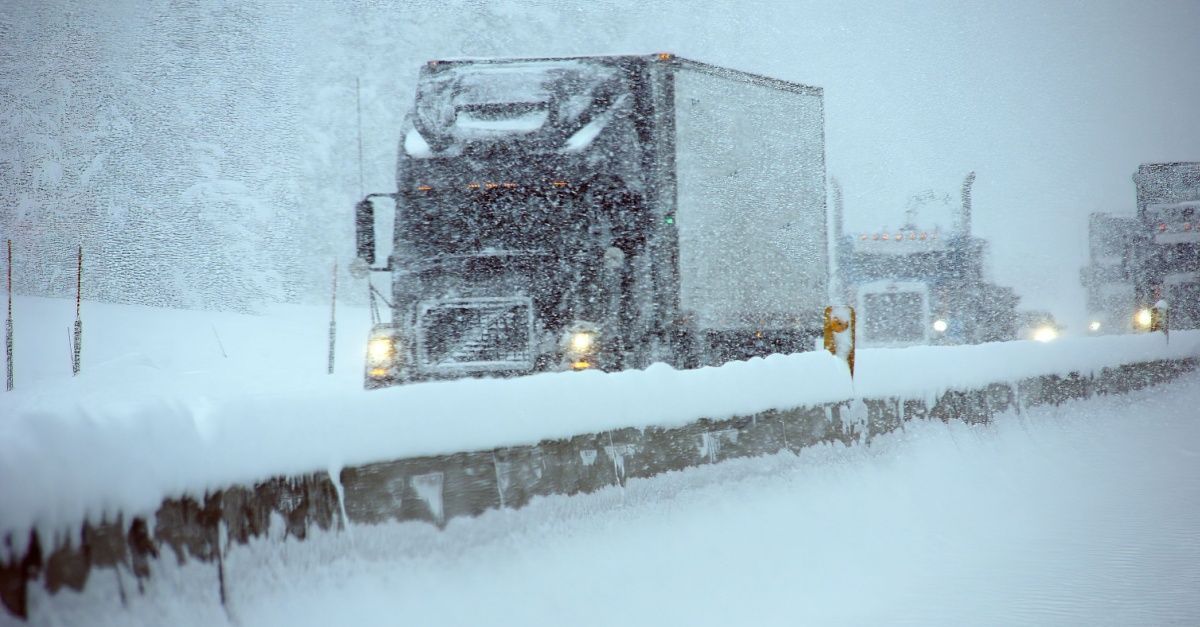Expedited or Express Shipping and Delivery Service 3PL: Why the Right Partner Makes All The Difference
Blog Post CTA
Expedited or Express Shipping and Delivery Service 3PL: Why the Right Partner Makes All The Difference
Even with the best-laid plans and relentless attention to detail, issues can still arise with the shipping of perishable goods and other sensitive cargo. When orders get delayed or delivery deadlines get moved up, the need for fast and reliable expedited delivery services becomes all the more vital. Short-distance rush deliveries are becoming more and more common, especially as the increase in e-commerce shipping demand shows no signs of slowing down anytime soon.
Freight shippers and transportation service providers often require expedited shipping assistance to meet tight deadlines and to provide custom-tailored delivery options for their customers. While most shipping and delivery services focus on long-haul orders and loads, the real money lies in premium shipping services focused on same-day and overnight delivery. This is the value inherent in expedited shipping and delivery services for all types of
temperature-controlled freight.
The Problems Inherent in Expedited Shipping and Delivery
As highlighted by Logistics Management, the Pitney Bowes Parcel Index revealed a continuing trend focused on e-commerce and online expedited shipping and delivery demands. “Due to a whole host of factors—including, most notably, the impact of the COVID-19 pandemic, more people staying at and working from home, among others—has led to a spate in e-commerce- based parcel shipping activity, which kicked off, in earnest, in March 2020, and has not subsequently abated since then.” The Pitney Bowes Parcel Shipping Index also revealed some surprising data about shipping and transportation services and trends across 13 different countries and is based on the parcel shipping and delivery needs of more than 3.8 billion people each year.
For the 2020 calendar year, the report showed global parcel volumes hitting nearly 131.2 billion, or an estimated 4,160 parcels shipped per second. This was a 27% annual gain over the previous year in addition to parcel revenue, estimated at nearly $429.5 billion, showing a staggering 22% since 2019. This sudden spike in demand has challenged the shipping industry like never before. It has led to changes within the transportation market that will continue for years in the foodservice industry.
With so much potential for increased sales and improved customer experience, there are some key reasons why expedited delivery services are still so difficult for many shipping and trucking companies to manage successfully. These range from problems with workforce and equipment to simply logistical and managerial concerts. Some of the most common issues inhered in expedited shipping and delivery can include the following:
Issues With Documentation and Paperwork
One of the most significant obstacles for speedy produce shipping and temperature-sensitive cargo in the paper trails that are often involved. Today, many expedited delivery service providers have specialized cloud-based tracking and loading dashboards designed to manage paperwork and documentation. From order forms and load manifests to invoice copies and customs paperwork, everything drivers need for quick pick up and get on their way can be uploaded, managed, and accessed with expedited delivery apps and dashboards.
Limited Visibility Into Cargo Status and Condition
Another issue inherent with expedited shipping services is the limited visibility that often comes with these rush pickup and dropoff loads. When drivers pick up pallets and containers at a warehouse, distribution center (DC) hub, airport, or other holding location, there often is no time nor an easy way to inspect the load. Any damages or issues with the contents of the load are challenging to check for and document. An experienced expedited transport professional will know how to check shipments quickly and efficiently during loading and unloading.
Nonuniform Protocols and Shipping Processes
One issue that becomes abundantly clear to shippers dealing with urgent and rush orders is how processes and protocols can differ from one location to the next. Paperwork needed at one center might be useless elsewhere. And documentation required for one type of cargo will be completely different from another load manifest. Every customer, delivery location, holding facility, and shipping company can have slightly different transfer processes. Thankfully, working with expedited delivery service providers makes all of this easier to manage and negotiate.
Limited Driver Availability for Rush Loads
A big obstacle that shippers have to face when offering expedited freight services is the simple lack of available drivers who are skilled enough to handle the specialty loads that often come with rush-handling requirements. Driver shortages are impacting the shipping and transportation industry in general, and the impact of specialty and rush-delivery providers is even more devastating. Expedited shippers know how to handle these sorts of orders and make it easier with their carrier of choice and pre-vetted status and rankings in the industry today.
Poor Means of Communication or Collaboration
Expedited delivery services also come with concerns over lines of communication and the accuracy of data and information getting shared and distributed. Information issues are common without access to real-time data and value-driven decision-making processes. When dealing with urgent orders and tight delivery timelines, errors in miscommunication and simple understandings can be devastating. Thankfully, experienced rush shipping experts know how to respond and frequently communicate needs at all times.
Issues Dealing With Delays and Other Disruptions
The final big obstacle facing transportation service providers specializing in premium rush shipping service options is delays and disruptions. They will occur now and then, no matter how much planning and preparation happens, and a slight misstep in how issues resolve themselves can throw off the entire delivery process. Expedited freight transportation requires vital predictive planning and expert insights. This is possible with the right freight shipping partners, experienced shipping service providers, and third-party freight transporters.
3PL Expertise in Expedited Freight Services Is Essential to OTIF Deliveries.
Expedited freight shipping in today’s transportation market refers to the specialized method of shipping freight that focuses on both the speed and stability of the cargo that needs hauling. This method of short-distance freight transport focuses on ways to ensure goods arrive faster than regular transit times and helps shippers make good on their promise of on-time, in-full deliveries.
To speed up the shipping process, trucks carrying expedited goods rarely stop along the way and travel nonstop from pickup to the delivery destination.
Inbound Logistics highlighted this trend in a Nov. 15, 2021, article: “In today’s e-commerce-driven supply chains, speed is practically a given. Consumers want their orders fast, whether same-day, next-day, two-day, express, expedited, priority, or standard. That demand has accelerated even quicker during the pandemic, motivating shippers to find ways to optimize transportation to be fast and affordable.” Because of this rush and nonstop line, expedited freight focuses on accommodating deliveries within 1-2 neighboring zones. With drivers having to drive with little to no stops once they begin, there is a limit to how far these expedited freight hauling services can reach.
Long-distance shipments do not work well with expedited shipping loads due to the sensitivity of the loads and the mode-specific method of transportation required. However, freight loads and cargo types can benefit from short-distance expedited delivery services, especially those classified as
reefer transportation freight and other temperature-sensitive cargo types.
How a Rush Shipping Service Streamlines Everything
Securing rush shipping service from a third-party provider is often the easiest way to find reliable drivers. Having the dedicated pool of drivers to fall back on and the peace of mind that comes from knowing in advance where to turn when you need expedited delivery service is a welcomed change. Working with a 3PL is better, for several reasons.
1. Dedicated Expertise in Expedited Transportation
Expedited delivery services are easier to attain and manage when working with industry partners who have the tools and insights necessary to make deliveries on time, safely, and securely. Accessing dedicated freight solutions and expedited shipping services result in easier scheduling and more efficient transportation modes and services, all at an affordable price.
2. An Actual Person to Answer Urgent Requests
Unlike many standard shipping services, dedicated, expedited delivery providers connect shippers with genuine customer service representatives. Rather than waiting for emails and return calls or wasting time dealing with old and out-of-date data, urgent delivery customer service experts deal with real-time information and communications.
3. An Understanding of the Nuances Going Into Each Shipment Type
Every shipment has specialized handling and transportation needs, and qualified expedited delivery service experts know how to deal with these restrictions. Refer freight, food and beverages, animals and plants, pharmaceuticals, and other temperature-sensitive freight loads can be easily managed and protected with specialized handling services during shipment.
4. Someone That Knows the Differences in Air Terminal and Customs Requirements by Location
Every mode of transportation, whether air, sea, or land, has unique parameters and regulations for loading and unloading these kinds of loads. When dealing with expedited shipping and handling, expedited delivery service providers know what and what not to do. They can sail through customs and handle specific requirements more quickly and efficiently.
5. Able to Assist With Managing the Whole Process, Including Ground Transportation Between DCs/Warehouses
One of the biggest issues shippers face when managing the ins and outs of expedited delivery services is dealing with end-to-end processes. Organizing and coordinating between warehouses, distribution centers, freight centers, and transportation hubs present unique challenges that are easier to overcome and manage with the right rush shipping 3PL.
6. Access to a Pre-Qualified Driver Pool With a Proven Performance Record
For shippers not familiar with the processes involved with expedited delivery services, finding drivers who are both qualified and available for these specialized freight loads can be quite the challenge. Pulling from talent pools filled with professional drivers can help shippers match the right driver to the correct load for optimal performance and expedited shipment success.
7. Uses Technology to Manage by Exception
Implementing specialized expedited delivery services and rush shipping service options becomes second nature when the right approach applies to the issues at hand. The entire process can become more streamlined by managing by exception and allowing drivers to self-manage when possible. The whole process quickly becomes more streamlined. These 3PL providers provide the tools and technology necessary to improve freight management from start to finish.
8. Knows When to Outsource to Other Expert Providers, Including Other Expedited Service Providers When Necessary
The actual revelation shippers who offer expedited delivery services must realize is that outsourcing is necessary and often adventitious. Partnering with industry leaders and service providers allows team members to delegate better and manage productivity while reducing costs and improving processes throughout the trucking service industry.
9. Keeps an Eye on Total Costs to Ensure Accuracy of Invoicing and Payment Processing
At times, the costs associated with premium expedited delivery services can become a complex tangle of paperwork and invoices. Working with dedicated rush shipping providers and 3PL partners can help speed up payments, improve accuracy, and reduce payment errors. Providing optimized payment services for premium delivery helps keep customers satisfied.
10. Able to Handle Reconsignments and Transshipments of Expedited Freight
Re-consignment of expedited delivery service loads and sudden destination changes can easily be made on the fly. Transshipments and unexpected off-loads at intermediate destinations along the way can be overcome for expedited freight services with the proper freight handling protocols in place. 3PLs make it all easier, no matter what refrigerated cargo is involved.
Streamline Express Shipping Management With Entourage Freight Solutions
The idea of expedited freight services has been around for many years. It has become a part of shippers’ everyday transportation planning solution to deal with the growing pressure of capacity constraints and driver shortages. The real question is this: Can shippers and transportation companies utilize premium, expedited shipping options to help sustain the supply chain through the current capacity crunch and other disruptions and obstacles predicted for the near future?
The importance of expedited delivery service primarily focuses on the intricacies of customer satisfaction. Today’s ultimate goal for
trucking companies is finding customers and keeping them happy and engaged. At the same time, management logically wants to do all they can to reduce fees and maximize profits. Partnering with a skilled and experienced rush order shipping expert can make the difference for both short-and long-term business goals.
Partnering with a rush shipping service provider is a significant first step to future-proofing any fleet and continuing the expected trend of offering express delivery and shipping options.
Contact Entourage Freight Solutions today to learn more, get started, and make expedited reefer shipments faster and easier.









